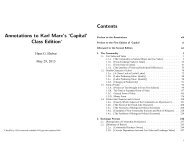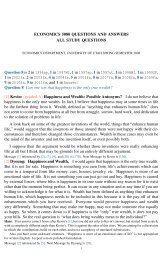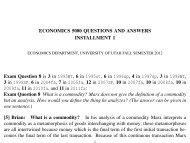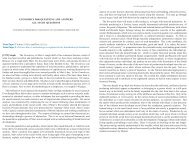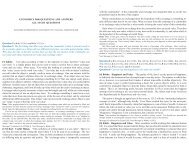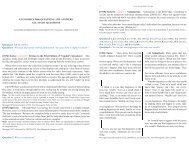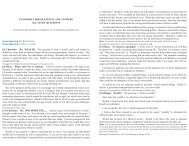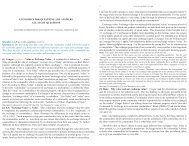Question 1 What did Marx mean with his formu - University of Utah
Question 1 What did Marx mean with his formu - University of Utah
Question 1 What did Marx mean with his formu - University of Utah
Create successful ePaper yourself
Turn your PDF publications into a flip-book with our unique Google optimized e-Paper software.
U <strong>of</strong> <strong>Utah</strong> Econ 5080 2007fa 75<br />
commodity by which the value <strong>of</strong> the commodity A is expressed. But the commodity B<br />
in its natural form is a use-value since all commodities are use-values. Hence says <strong>Marx</strong>,<br />
“The first peculiarity ... is ... that use-value becomes the form <strong>of</strong> appearance <strong>of</strong> its opposite,<br />
value.” (Capital, p148)<br />
(ii) The value relation equates the value <strong>of</strong> the commodity A created by the abstract labor,<br />
say, m <strong>with</strong> its equivalent <strong>of</strong> the commodity B in its natural form created by the concrete<br />
labor, say, n. Thus, in value relation, the concrete labor n becomes a tangible expression<br />
<strong>of</strong> the abstract labor m. Hence says <strong>Marx</strong> that the second peculiarity is that “concrete labor<br />
becomes the form <strong>of</strong> manifestation <strong>of</strong> its opposite, abstract human labor.” (Capital, p 151)<br />
(iii) By (ii), the concrete labor n now counts as the identical abstract labor. But the former<br />
is a private form <strong>of</strong> labor carried out by private individuals while the latter is a social form<br />
<strong>of</strong> labor derived by averaging out all the concrete labor available in the given society. Hence<br />
says <strong>Marx</strong> that the third peculiarity is that “private labor takes the ... social form.” (Capital,<br />
150:4/o)<br />
Hans: The three dots in your last <strong>Marx</strong> quote skip over the word “directly” or “immediately.” T<strong>his</strong> is an important<br />
word which you should not have skipped. Private labor in capitalism is social labor, but not directly social labor<br />
because it first has to pass the test <strong>of</strong> the market. The labor producing the commodity in equivalent form does not<br />
have to pass through t<strong>his</strong> test. The linen weaver’s willingness to exchange her linen for the coat is pro<strong>of</strong> that the<br />
labor in the coat fits into the social division <strong>of</strong> labor, that its product is needed by others.<br />
Next Message by HTJY is [293].<br />
<strong>Question</strong> 212 is 130 in 1998WI:<br />
<strong>Question</strong> 212 When <strong>Marx</strong> talks about the “defects” <strong>of</strong> the Simple form <strong>of</strong> value, in what<br />
respect are they defects?<br />
[694] Deborah: Simply Defective. In explaining the Simple Form <strong>of</strong> Value, <strong>Marx</strong> points<br />
out defects in the expression – in relative form <strong>of</strong> value and in the equivalent form <strong>of</strong> value.<br />
“..and therefore also only places A in an exchange relation <strong>with</strong> one particular different kind<br />
<strong>of</strong> commodity, instead <strong>of</strong> representing A’s qualitative equality <strong>with</strong> all other commodities.”<br />
[154:2] “.. A commodity there corresponds to the Isolated equivalent form <strong>of</strong> another commodity.”<br />
[154:2]<br />
In the relative form <strong>of</strong> value, <strong>Marx</strong> points out that the simple form <strong>of</strong> value “represents<br />
value as something that is different from its use-value, but not as something that is qualitatively<br />
equal for all commodities.” (Annotations) <strong>What</strong> an individual will accept in exchange<br />
for their commodity is not equal across the board – not everyone will accept the same goods<br />
for the same trades. Annotations gives the example <strong>of</strong> an orchestra in which every musician<br />
plays <strong>his</strong>/her own melody. There is not a coherent “signal” in t<strong>his</strong> form. In the equivalent<br />
form <strong>of</strong> value, the two commodities being exchanged are only equivalents for each other –<br />
not <strong>with</strong> other commodities (the goods are poor incarnations <strong>of</strong> value).<br />
In the archives, Hans points out in <strong>his</strong> remarks to [1998WI:116] that Commodity A does<br />
not receive its value from Commodity B, instead it receives its value from labor, but it<br />
expresses its value in relation <strong>with</strong> Commodity B.<br />
Hans: Yes, the market relations through which value is expressed must be distinguished from the production<br />
relations which give value to the commodities. Commodities receive value in the production process, and they<br />
express their value in their exchange relations <strong>with</strong> each other. Market relations will only then be successful in<br />
76 2007fa Econ 5080 U <strong>of</strong> <strong>Utah</strong><br />
directing the production process, if t<strong>his</strong> expression (or reflection) <strong>of</strong> the underlying production relations on the<br />
market is accurate. <strong>Marx</strong> points out two respects in which the expression <strong>of</strong> value through a Simple exchange<br />
relationship is inaccurate: One <strong>of</strong> these two criticisms is directed at the relative form <strong>of</strong> value, the other at the<br />
equivalent form <strong>of</strong> value.<br />
Regarding the relative form, he says that the relative form <strong>of</strong> value distinguishes the value <strong>of</strong> a commodity<br />
from its use-value (which is good), but it fails to convey the fact that the value <strong>of</strong> all goods are the same (which<br />
is bad). Only an expression which conveys t<strong>his</strong> same-ness (and therefore allows the values <strong>of</strong> all commodities<br />
to be compared <strong>with</strong> each other) can give the right signals to the producers so that they know what is in demand<br />
and should be produced. (T<strong>his</strong> will then be resolved <strong>with</strong> money, which is indeed a common denominator for all<br />
commodities.)<br />
Regarding the Equivalent form, <strong>Marx</strong>’s criticism is that the commodity in the Equivalent form can be directly<br />
exchanged only for the commodity in the Relative form. Again, <strong>with</strong> money t<strong>his</strong> is alleviated, because money can<br />
be directly exchanged against everything. The situation that every commodity could be directly exchanged against<br />
every other commodity is not possible, because commodities are produced privately and spontaneously, and it is<br />
never certain if a given commodity meets a social need or not.<br />
First Message by Deborah is [43].<br />
[714] Walmart: Faulty Forms. When <strong>Marx</strong> talks about the “defects” <strong>of</strong> the Simple form<br />
<strong>of</strong> value, in what respect are they defects?<br />
<strong>Marx</strong> says that while the expression as a whole is not defective, two poles <strong>of</strong> it contain<br />
defects. “The expression <strong>of</strong> the value <strong>of</strong> commodity A in terms <strong>of</strong> some arbitrary other commodity<br />
B merely distinguishes the value <strong>of</strong> A from the use-value <strong>of</strong> A, and therefore also<br />
only places A in an exchange relation <strong>with</strong> one particular different kind <strong>of</strong> commodity, instead<br />
<strong>of</strong> representing A’s qualitative equality <strong>with</strong> all other commodities and its quantitative<br />
proportionality to them.” In other words, the expression <strong>of</strong> value does not play an equalizing<br />
role for every commodity on the market.<br />
The second place where the same defect is visible is in the relative form <strong>of</strong> value <strong>of</strong> a<br />
commodity corresponding to the equivalent form <strong>of</strong> another. The examples <strong>Marx</strong> <strong>of</strong>fers is<br />
the relationship between linen and a coat. In the relative expression <strong>of</strong> value <strong>of</strong> the linen, the<br />
coat possesses the form <strong>of</strong> equivalent, the form <strong>of</strong> direct exchangeability, only in relation to<br />
linen. T<strong>his</strong> is not true <strong>of</strong> commodities other than linen.<br />
Hans: Regarding your first sentence: the expression as a whole is defective too; but these defects will be ironed<br />
out in the development to the Money form <strong>of</strong> value.<br />
In the last sentence <strong>of</strong> your first paragraph you had “expression <strong>of</strong> use-value”; I changed it to “expression <strong>of</strong><br />
value.”<br />
Instead <strong>of</strong> your very last sentence, you should have said: “T<strong>his</strong> is a defective expression, since the labor in the<br />
coat is not only equal to the labor in the linen but to all labor.”<br />
Next Message by Walmart is [715].<br />
<strong>Question</strong> 216 is 223 in 2008SP, 221 in 2008fa, 234 in 2009fa, 261 in 2010fa, 225 in<br />
2011fa, and 235 in 2012fa:<br />
<strong>Question</strong> 216 How does it become plain here that it is not the exchange <strong>of</strong> commodities<br />
which regulates the magnitude <strong>of</strong> their values, but rather the reverse, it is the magnitude <strong>of</strong><br />
the value <strong>of</strong> commodities which regulates the proportion in which they are exchanged?<br />
[101] Tyler: ambiguity <strong>of</strong> values. T<strong>his</strong> ambiguity <strong>of</strong> values: “There are a thousand<br />
different kinds <strong>of</strong> value, as many kinds <strong>of</strong> value as there are commodities in existence.” Is<br />
the reason we have adopted the concept <strong>of</strong> fiat money. Rather than basing the price <strong>of</strong> a good<br />
on barter, we have a set price for a good. Therefore everyone will pay for the product <strong>with</strong>



